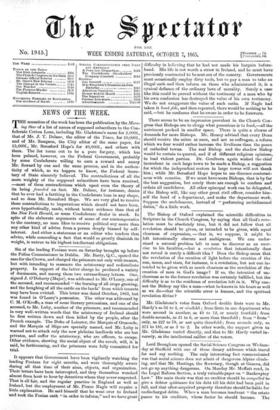The Bishop of Oxford explained the scientific difficulties in Scripture
in the Church Congress, by saying that all God's reve- lation must be absolutely true, but it did not follow that all revelation should be given, or intended to be given, with equal clearness of expression, — that is, we suppose, it might be left intentionally obscure and ambiguous. We can under- stand a natural problem left to man to discover as an exer- cise to his faculties,—but a revelation that intentionally does not reveal is surely a difficult idea ? Does the Bishop mean that the revelation of the creation of light before the creation of the sun, moon, and stars, for instance, is a revelation, but not one in- tended to be given with so much clearness as the revelation of the creation of man in God's image? If so, the intention of un- clearness as to the former revelation was certainly fulfilled, but the difficulty is as to the residuum of revelation left in it. Why can- not the Bishop say like a man—what he knows in his heart as well as we do—that the scientific error is human, and the spiritual revelation divine?






























